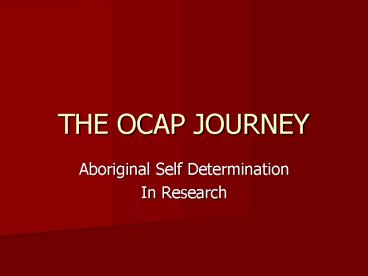THE OCAP JOURNEY - PowerPoint PPT Presentation
1 / 20
Title: THE OCAP JOURNEY
1
THE OCAP JOURNEY
- Aboriginal Self Determination
- In Research
2
Aboriginal Peoples
- The term Aboriginal Peoples refers to the First
Nations, Metis and Inuit Peoples of Canada or as
we refer to it Turtle Island - Beyond these terms there is an incredible
diversity of languages, cultures, political and
social structures.
3
Research as a Dirty Word
- Aboriginal Peoples and communities have been
subjects of research with variable outcomes
negative, positive and a combination - Aboriginal Peoples are Canadas Lab Rats. We
have been researched to death. - The term research is inextricably linked to
European colonialism and imperialism
4
Goal of Aboriginal Community Based Research
- Shift the research paradigm from one where
outsiders seeks solutions to the Aboriginal
problem to one in which Aboriginal people
conduct research and facilitate solutions
themselves
5
Goal of CBR continued
- Working with Aboriginal peoples and communities
should involve the researcher and community in a
reflexive process of negotiation and build
community capacity for research
6
The Right to OCAP
- The right to Ownership, Control, Access and
Possession in research is tied to
self-determination and the preservation and
development of our culture - Move to a more holistic community based
action-oriented approach that is Aboriginal
driven (away from a deductive empirical
university driven model)
7
Research Protocols
- Agreement on research protocols between
researchers and communities - The research agreement is not a product but a
constant learning and changing process that is
oral in nature, flexible and open-ended
8
A Living Agreement
- Principles of OCAP must be negotiated in good
faith - Any agreement reached is a living agreement that
must be revisited over the life of the project
9
Ethical Guidelines
- Confidentiality, risk/benefit, informed
consentthe usual ones - Respect for the community and its culture
- The ethic of equal participation and consultation
that incorporates local and traditional knowledge
10
Community Ethical Considerations
- Research ethics and protocols have more to do
with doing good for the community beyond the
protection of individual subjects - Researchers must go beyond the standard
scientific or medical ethical model
11
Ethics continued
- Academic interest is fine but the research must
ultimately benefit the community, i.e. potential
to influence policy, practice, personal/community
change etc. - Projects are assessed to see if they address
community-relevant priority issues (Aboriginal
self-determination)
12
Ethics continued
- Both individual research subjects AND the
community should be equally involved in all
aspects of research - This is a holistic view of research where
contributions of the Aboriginal community members
and researchers are of equal value
13
Capacity Building
- A reciprocal process of capacity building is
undertaken - Local/traditional knowledge is shared
- Aboriginal needs for capacity building in
community-based research are accommodated,
acknowledged and promoted
14
Science
- Scientific goals are respected along with respect
and inclusion of Aboriginal knowledge and
methodologies
15
Community Consultation
- When research questions and protocols are being
developed - When data is collected and analyzed
- When findings are generated communities are
given ample opportunity for feedback and
participation in the dissemination of research
findings
16
Community Consultation continued
- Community input is critical in developing
knowledge translation strategies which are
meaningful and appropriate to the
audienceacademic or community - Community involvement in needs assessments,
identifying research questions, collecting and
analyzing data, and reporting and applying the
results
17
Principles of OCAP
- Ownership
- Control
- Access
- Possession
18
Principles
- Ownership This challenges the notion of
intellectual property - Control This challenges the notion of academic
freedom - Access Community access versus individual
confidentiality - Possession The right to possess the findings
19
Decolonizing
- These principles are aimed at decolonizing the
research process - Research Aboriginal communities to life
20
Respect
- Protect communities against stigma and
stereotyping - Community consent to research
- Community control over the research process
- Community control over how the results are
interpreted - Community control over how the research results
are used












![[DOWNLOAD]⚡️PDF✔️ Through Indian eyes: A journey among the Indian tribes of Guiana PowerPoint PPT Presentation](https://s3.amazonaws.com/images.powershow.com/10132898.th0.jpg?_=20240918086)
![[DOWNLOAD]⚡️PDF✔️ Through Indian eyes: A journey among the Indian tribes of Guia PowerPoint PPT Presentation](https://s3.amazonaws.com/images.powershow.com/10132077.th0.jpg?_=20240917088)
![[DOWNLOAD]⚡️PDF✔️ Through Indian eyes: A journey among the Indian tribes of Guia PowerPoint PPT Presentation](https://s3.amazonaws.com/images.powershow.com/10136060.th0.jpg?_=202409231112)
















